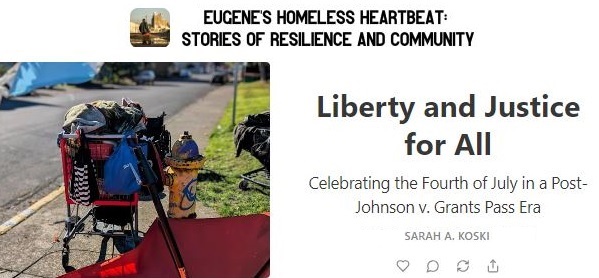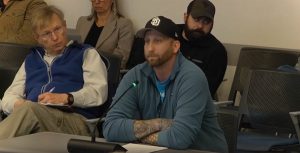Liberty and justice for all
4 min read
Celebrating the Fourth of July in a post-Johnson v. Grants Pass era
by Sarah Koski
Homelessness is a complex problem significantly impacting our community. A lack of affordable housing, limited shelter capacity, and scarce mental and behavioral health resources contribute to the more than 3,000 people experiencing homelessness in Eugene, more than 2,000 of whom are without shelter every night.
As we celebrate the Fourth of July, we are reminded of the ideals that our nation was founded upon: “We the People,” “unalienable rights,” and the belief that “all men are created equal.” Yet, the reality for many of our fellow citizens tells a different story. Last year’s federal point-in-time survey found more than 653,000 people experiencing homelessness nationwide — a 12% increase from 2022, and a record high.
This data underscores the growing urgency for effective solutions as cities and towns nationwide grapple with the challenge of balancing compassion for those in need with the imperative to maintain safe and sanitary public spaces. On this day, when we commemorate the freedoms and rights enshrined in our nation’s founding documents, it is crucial to reflect on those who are our most vulnerable to persuasive hate, bias, and far-reaching injustice — our nation’s poor and the unhoused.
The sight of thousands living without shelter starkly contrasts with the principles of liberty and justice that we hold dear. As we light fireworks and celebrate our nation’s independence, let us not forget that true freedom can only be achieved when every individual has the opportunity for a safe and stable life.
Recently, the U.S. Supreme Court issued a ruling on a case from Grants Pass, Oregon, which could significantly alter how cities respond to homelessness nationwide. In Johnson v. Grants Pass, the court ruled in favor of the city, deciding that penalizing people for camping outside does not violate the Constitution. This decision potentially empowers cities and counties across nine states and two territories in the western U.S. to enforce stricter rules against homeless people sleeping on public property, including arrests, fines, and jail time.
This ruling builds on precedents set by similar cases and intersects with Oregon’s House Bill 3115, passed in 2021. The law allows local governments to impose time, place, and manner restrictions on sleeping on public property, provided these regulations are “objectively reasonable.” The law was a factor in the failure of Portland’s last attempt to ban daytime homeless camps, as a Multnomah County judge blocked it, deeming it unreasonable. Unless the legislature decides to revisit the law that HB 3115 enacted, sweeping policy changes in Portland following the Supreme Court ruling are unlikely.
Instead, cities will still need to be attentive to the text of Oregon’s law, which hinges on those “time, place, and manner” restrictions. This means that cities can still ban camping entirely, for instance, in fire-prone areas during the summer (time), in front of schools or on sidewalks (place), or with hazards like cooking stoves and bonfires (manner).
Oregon, known for its progressive values and policies, faces unique challenges and opportunities in addressing homelessness. The state’s homeless population is among the highest in the nation, with significant numbers in urban centers like Portland and Eugene. Despite efforts to provide support and resources, the gap between the needs of the homeless and the available services remains wide.
We, the people of Eugene, Oregon, need to choose that despite rulings and court cases, despite the never-ending sweeps and displacement of shelters, and despite the negativity and injustices that surround our local unhoused, we fight for freedom and justice for all. We must stand united in our commitment to uphold the principles of our nation by advocating for policies and actions that reflect our shared humanity. It is not enough to celebrate liberty and justice in words; we must embody these ideals in our actions.
As a community, we can push for more affordable housing, expand mental and behavioral health services, and create sustainable support systems that offer real, long-term solutions. By fostering a culture of empathy and understanding, we can work towards a future where every individual, regardless of their circumstances, has the opportunity to thrive.
Let this Fourth of July be a call to action. Let us pledge to transform our patriotic spirit into meaningful change. By addressing the root causes of homelessness and supporting comprehensive solutions, we can ensure that the promise of “We the People” and the belief that “all men are created equal” are not just historical ideals, but lived realities. In doing so, we honor the true spirit of our nation and create a community where liberty and justice truly prevail for all.
Sarah Koski left nonprofit management and creative consulting in 2022 for 100% homelessness support and advocacy. “Eugene’s Homeless Heartbeat: Stories of Resilience and Community” appears at sarahcascadia.substack.com.






